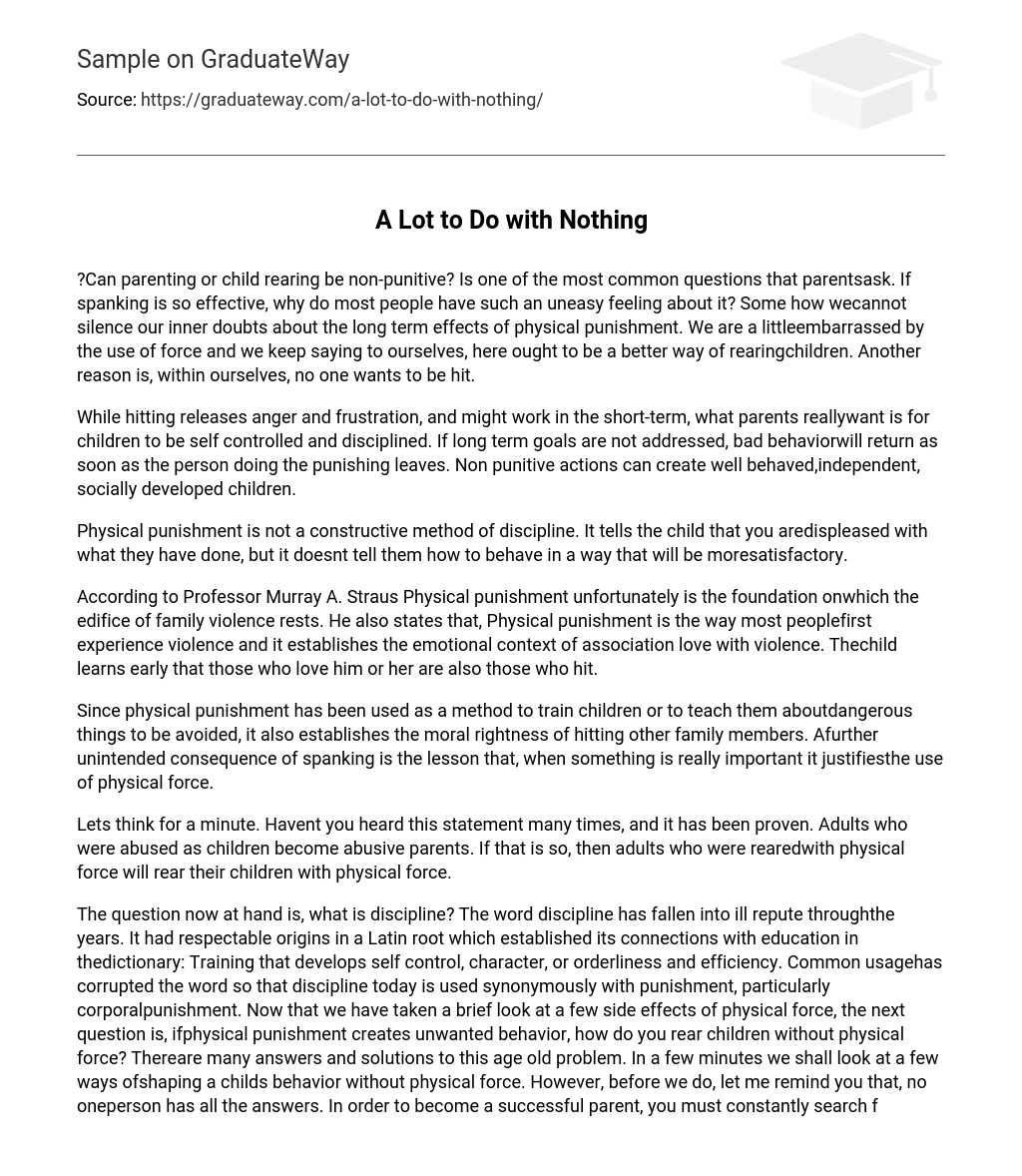- Can parenting or child rearing be non-punitive?
Is one of the most common questions that parentsask.
- If spanking is so effective, why do most people have such an uneasy feeling about it?
Some how wecannot silence our inner doubts about the long term effects of physical punishment. We are a littleembarrassed by the use of force and we keep saying to ourselves, here ought to be a better way of rearingchildren. Another reason is, within ourselves, no one wants to be hit.
While hitting releases anger and frustration, and might work in the short-term, what parents reallywant is for children to be self controlled and disciplined. If long term goals are not addressed, bad behaviorwill return as soon as the person doing the punishing leaves. Non punitive actions can create well behaved,independent, socially developed children.
Physical punishment is not a constructive method of discipline. It tells the child that you aredispleased with what they have done, but it doesnt tell them how to behave in a way that will be moresatisfactory.
According to Professor Murray A. Straus Physical punishment unfortunately is the foundation onwhich the edifice of family violence rests. He also states that, Physical punishment is the way most peoplefirst experience violence and it establishes the emotional context of association love with violence. Thechild learns early that those who love him or her are also those who hit.
Since physical punishment has been used as a method to train children or to teach them aboutdangerous things to be avoided, it also establishes the moral rightness of hitting other family members. Afurther unintended consequence of spanking is the lesson that, when something is really important it justifiesthe use of physical force.
Lets think for a minute. Havent you heard this statement many times, and it has been proven. Adults who were abused as children become abusive parents. If that is so, then adults who were rearedwith physical force will rear their children with physical force.
The question now at hand is, what is discipline? The word discipline has fallen into ill repute throughthe years. It had respectable origins in a Latin root which established its connections with education in thedictionary: Training that develops self control, character, or orderliness and efficiency. Common usagehas corrupted the word so that discipline today is used synonymously with punishment, particularly corporalpunishment.
- Now that we have taken a brief look at a few side effects of physical force, the next question is, ifphysical punishment creates unwanted behavior, how do you rear children without physical force?
Thereare many answers and solutions to this age old problem. In a few minutes we shall look at a few ways ofshaping a childs behavior without physical force. However, before we do, let me remind you that, no oneperson has all the answers. In order to become a successful parent, you must constantly search for ideasand put them into action. Also remember, noting changes or can be accomplished successfully overnight,but with diligence and patience it can be done. If you need help in these areas by all means take care ofthem first. Diligence and patience is a must in rearing children.
Ways of shaping a childs behavior can be accomplished through praise, stern words, love andaffection, consistency, understanding child development and using developmental techniques, buildingstrong family ties, good nutrition, physical education, sex education, and your childs academics.
PraiseThats the word from educations and experts who say praise is the most powerful weapon a parentcan wield in shaping a childs behavior . As behavior expert Olga Davis of Miami, Florida points out,Children crave attention and plenty of it. By praising all the nice things they do, theyll act like little ladiesand gentlemen just to hear you tell them how wonderful they are. Here are some expert tips she offers tohelp you along the way: Be specific in your praise, also be creative. Your child will become tired of hearingyou tell them that their smart or good all the time. Use the adjective at your command. Remember,sometimes a simple pat on the back will do. When you praise a child you create self condifence in him. Achild who believes in their own worth are able to face the challenges of the world. They are not afraid tomake an occasional mistake. Letting your child know that you have confidence in him, youre giving him theconfidence that will help him have a successful outcome while he is under going the different stages ofdevelopment.
Stern WordsAccording to Nancy Samalin, Director of Parent Guidance Workshops, Children need to know t hatyou are the adult, that you are taking responsibility for some things. Here are some tips which allow parents to spare the rod without spoiling the child:
- Provide choices, instead of telling Johnny not to play with his water gun in the living room, give him authorization to play with t in a designated place. For instance say, play with thewater gun in the bathroom or the backyard. This is a great behavioral tool. Ms. Samalinalso points out that providing choices you eliminate the need for power struggle.
- Let children help seek solutions.
- Follow the one word rule. Instead of preaching, lecturing, or threatening boil commandsdown to a few key words. One example: youve told your child a dozen times to put theirtoys away and she hasnt done it. Instead of going on and on about how tired you are ofpicking up after them simply say, Toys





